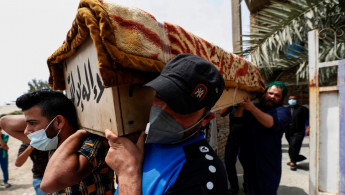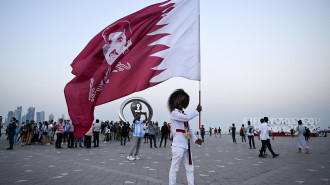The Iraq Report: Deadly hospital fire illustrates Iraq's corruption problem
Considering its lengthy history of misfortunes, Iraq suffered yet another tragedy on Saturday as a blaze ripped through a Baghdad hospital, killing at least 82 people and wounding dozens of others, many of whom were coronavirus patients.
The fire prompted the government to sack and suspend a number of senior officials, yet Iraqis have levelled further allegations of corruption and mismanagement at the authorities, who they say have failed to ensure public safety over personal gain.
As Iraq faces the worst coronavirus outbreak in the Middle East, and with summer swiftly approaching, Iraqis have also faced state-backed violence against protesters demanding a resolution to the country's endemic electricity shortages.
While the authorities have taken steps to explore the construction of nuclear reactors, Iraq has urgent energy shortfalls that, if not remedied, will likely lead to yet another widespread outbreak of protests when searing summer temperatures begin to heat tempers.
Corruption blamed for deadly hospital fire
In one of the worst instances of official mismanagement and negligence leading to widespread death, an inferno possibly caused by an exploding oxygen tank tore through the second floor of the Ibn al-Khatib hospital in Baghdad on Saturday.
 |
Iraq suffered yet another tragedy on Saturday as a blaze ripped through a Baghdad hospital, killing at least 82 people and wounding dozens of others |  |
Iraq's interior ministry issued a statement on Sunday placing the death toll at 82 people with more than 110 suffering injuries. Among the dead were at least 28 patients on ventilators battling severe symptoms of the virus, tweeted Ali al-Bayati, a spokesman of the country's independent Iraqi Human Rights Commission, a semi-official body.
Firefighters rushed to battle the fire and eventually civil defence teams put out the flames in the early hours of the morning. Ambulances transported dozens of wounded, with the health ministry confirming at least 200 people were rescued from the scene.
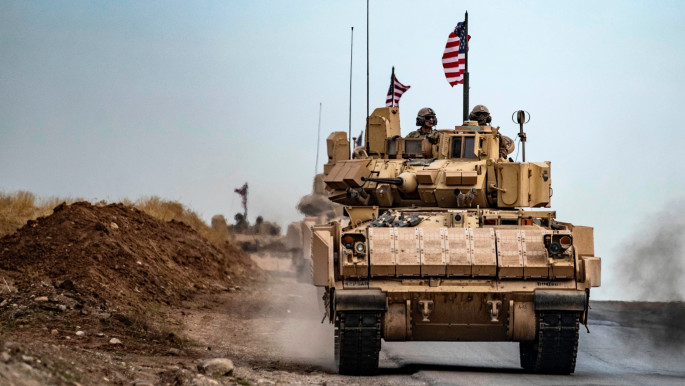 |
|
| Read more: The Iraq Report: Iran locks in its influence as US plans troop withdrawal |
In response to the fire, Prime Minister Mustafa al-Kadhimi fired the director-general of the Baghdad Health Department in the Rusafa area where the hospital is located. He also fired the director of Ibn al-Khatib Hospital and its director of engineering and maintenance, according to a statement from the health ministry and his office.
Kadhimi blamed the fire on criminal negligence and promised a prompt investigation. "Negligence in such matters is not a mistake, but a crime for which all negligent parties must bear responsibility," he said.
Iraqis took to social media to call for the sacking of Health Minister Hassan al-Tamimi, with many saying the fire was yet another example of the state's corruption and mismanagement leading to the death and misfortune of normal Iraqis.
Their sentiments were echoed by President Barham Salih, who tweeted that the fire was "as a result of the mounting destruction of the state's institutions due to corruption and mismanagement" and that "showing sympathy [with the victims] is not enough without severe punishment against the perpetrators."
However, this is not the first time issues relating to Iraq's crumbling healthcare system have been raised. A public report on the dire situation of the health sector was published in 2017 and yet none of the recommendations were implemented.
 |
A public report on the dire situation of the health sector was published in 2017 and yet none of the recommendations were implemented |
 |
"It's mismanagement that killed these people," a doctor who, on condition of anonymity, angrily listed the hospital's many shortcomings to AFP. "Managers walk around smoking in the hospital where oxygen cylinders are stored," he said. "Even in intensive care, there are always two or three friends or relatives at a patient's bedside."
"When equipment breaks down, our director tells us not to report it," said a nurse, in another hospital in Baghdad, indicating that the problem is far more widespread.
These institutions - which until the 1980s were the pride of Iraq, known across the Arab world for its free, high quality public health services - are now seen as an embarrassment by many. Their equipment is outdated, staff are poorly trained, and buildings are crumbling.
What is not commonly known outside of Iraq is that the health ministry is heavily influenced by Shia cleric Muqtada al-Sadr and his political appointees. The health minister is strongly supported by the Sadrists, leading many to believe that he will not face repercussions.
Sadr himself took to Twitter on Sunday and claimed that the hospital blaze was an attempt to discredit his political bloc before the upcoming elections scheduled for this October, adding that he "refused to be involved in such a dirty war".
Iraq has one of the worst corruption rates in the world, consistently ranking amongst the least transparent countries globally by Transparency International.
Considering Sadr's ties to the health ministry - which is as corrupt as other official bodies - as well as his involvement in stamping out the protest movement of 2019, Iraqis are likely to associate Sadr with graft and violence, discrediting the Shia cleric despite his attempts to cultivate a public image as an Iraqi nationalist.
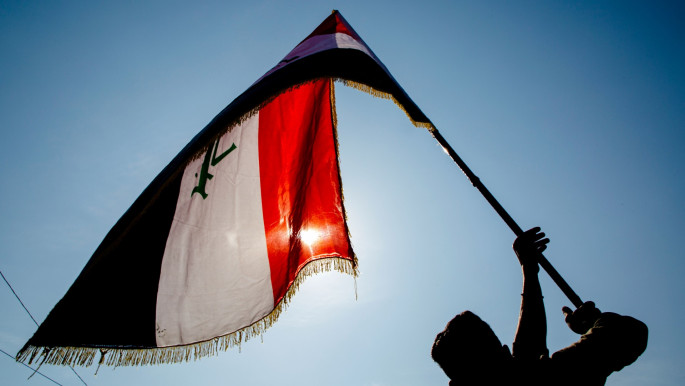 |
|
| Read more: Why Iraq's protest movement fears being co-opted by political elites |
Civil unrest amid an energy crisis
A demonstrator was killed and several others wounded amid a violent clampdown on protests in the Iraqi capital on Saturday.
The protester, named as Muhammad Sattar al-Delfi, was filmed as he was run over by security forces in Baghdad, enraging locals who vowed to return to the streets to demonstrate against ongoing power cuts leaving citizens with four hours of power a day.
At least 10 other demonstrators were also injured in the ongoing protests. Ali al-Bayati, a member of the semi-official Iraqi Human Rights Commission, said the violence will lead to continued demonstrations.
"The Iraqi government is repeating previous methods and behaviour in dealing with protesters. The continued delay in providing services to citizens will lead to continued protests and an emergence of a new era of demonstrations," Bayati said in a statement.
The protests were sparked on Friday night in Baghdad's Al-Wahda district where the electricity supply has been scarce with just four hours of power per day.
Security forces quickly intervened to disperse the protesters using live rounds and chasing demonstrators in armoured vehicles, forcing them to withdraw from the streets but not before killing Delfi and wounding almost a dozen others.
Speaking to The New Arab, local Al-Wahda official Saad Al-Lami said the problem goes beyond Baghdad's municipal borders. "The areas on the outskirts of Baghdad suffer from a great lack of services, specifically short hours in which electricity is provided to citizens amid high temperatures," Al-Lami said.
 |
With summer swiftly approaching, Iraqis have faced state-backed violence against protesters demanding a resolution to the country's endemic electricity shortages |  |
"Iraqis do not have any option but to protest against the government that has failed to provide electricity 18 years after the US occupation…[and] the Ministry of Electricity as well as all officials in the country continue to dismiss [the crisis] as if it were an unsolvable puzzle," Al-Lami added.
Plans to alleviate Iraq's energy crisis and its reliance on neighbouring Iran's power grid appear to already be in motion, however, as the Iraqi Radioactive Sources Regulatory Authority announced last Thursday that it had held talks with Russia, France, and the United States to build three nuclear energy reactors.
The reactors would be for civil use and primarily for the production of energy, providing much needed support to Iraq's aging power infrastructure. Under the Baathist dictatorship of Saddam Hussein, Iraq had a light water nuclear reactor known as the Temmuz facility which was constructed by the French.
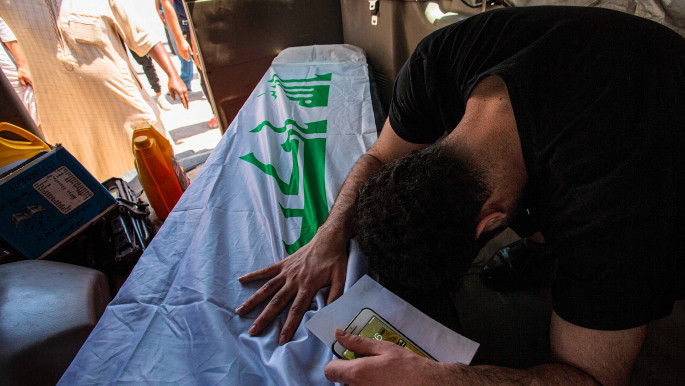 |
|
| The Iraq Report: Anti-corruption activists assassinated with impunity |
The facility, also known as Osirak, was ultimately bombed and destroyed by the Israelis in 1981 during Operation Opera designed to cripple the Iraqi nuclear programme even though the reactor was designed for research and not the production of atomic weapons.
However, the construction of these reactors will take many years to complete, if they get started at all. In the meantime, Iraq's lack of energy independence despite being one of the richest countries in terms of oil supplies in the world means that Iraqis will face yet another scorching summer without electricity to power much-needed air conditioning units.
Traditionally, this has led to almost annual protests, with the high temperatures of the summer months leading to flaring tempers and clashes between security forces and demonstrators.
However, and since the coronavirus pandemic, protests have been muted although there are signs that this year will be different. Demonstrators not only want to protest a lack of public services, but they are also sceptical about the transparency and fairness of the upcoming elections.
These two critical public issues will likely create the perfect storm of public anger that will only be further fuelled by the scorching temperatures. This will almost certainly spill out onto the streets and, unfortunately, it is likely that the government and allied Shia militias will respond as they have done historically – with violence and the loss of civilian life.
The Iraq Report is a regular feature at The New Arab
Click below to see the full archive
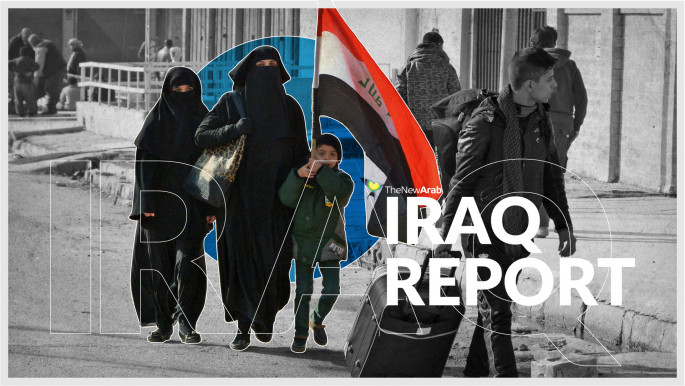 |
|
